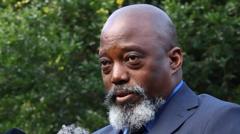
Former DRC President Joseph Kabila Returns Home After Two Years in South Africa
Kabila's Arrival Sparks Speculation and Anticipation Amidst Evolving Political Landscape
Kinshasa, Democratic Republic of Congo – Former President of the Democratic Republic of Congo (DRC), Joseph Kabila, has reportedly returned to the country after a two-year absence, during which he resided in South Africa. His arrival has ignited a flurry of speculation and analysis regarding his potential influence on the nation's current political climate.
Kabila, who served as president from 2001 to 2019, oversaw a period of significant change and challenges in the DRC. His departure from power marked the first peaceful transfer of power in the country's history, with Felix Tshisekedi assuming the presidency. However, Kabila's continued influence within the political sphere has remained a topic of considerable debate.
Reasons for Extended Stay in South Africa Remain Unclear
The exact reasons for Kabila's extended stay in South Africa have not been officially disclosed. Various theories have circulated, ranging from pursuing personal business interests to undergoing medical treatment. His absence has coincided with a period of political realignment within the DRC, marked by shifts in alliances and ongoing efforts to address persistent security concerns in the eastern regions of the country.
Potential Implications for the Current Government
Kabila's return raises questions about his future role in Congolese politics. While he has maintained a relatively low profile since leaving office, his political party, the Common Front for Congo (FCC), continues to hold a significant number of seats in parliament. Analysts are closely watching to see how his presence might impact the dynamics between the FCC and the current ruling coalition led by President Tshisekedi.
Some potential scenarios being considered include:
- Reassertion of Influence: Kabila could seek to reassert his influence within the FCC and potentially challenge the current administration's policies.
- Mediation Role: He may opt to play a more conciliatory role, acting as a mediator between different political factions to promote stability.
- Quiet Observer: It is also possible that Kabila intends to remain largely uninvolved in day-to-day politics, focusing instead on his personal interests.
Challenges Facing the DRC Persist
Regardless of Kabila's intentions, the DRC continues to grapple with a multitude of challenges, including:
- Security Concerns: Ongoing conflict in the eastern provinces, driven by various armed groups, continues to displace civilians and hinder development.
- Economic Instability: The DRC's vast natural resources have not translated into widespread prosperity, with poverty and inequality remaining significant issues.
- Governance Challenges: Corruption and weak governance structures continue to impede progress and undermine public trust.
International Community Monitoring Developments
The international community is closely monitoring the political developments in the DRC. The United Nations and other international organizations have expressed their commitment to supporting the country's efforts to address its challenges and consolidate democratic gains.
Kabila's return adds another layer of complexity to the DRC's already intricate political landscape. The coming weeks and months will be crucial in determining the extent of his influence and the impact on the country's trajectory.
Further Developments Expected
Further analysis and reporting will be provided as more information becomes available regarding Kabila's plans and activities in the DRC. The situation remains fluid, and observers are keenly awaiting further developments.
